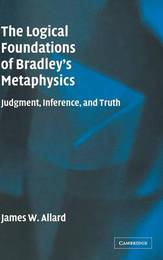
|
The Logical Foundations of Bradley's Metaphysics: Judgment, Inference, and Truth
Hardback
Main Details
| Title |
The Logical Foundations of Bradley's Metaphysics: Judgment, Inference, and Truth
|
| Authors and Contributors |
By (author) James Allard
|
| Physical Properties |
| Format:Hardback | | Pages:262 | | Dimensions(mm): Height 236,Width 161 |
|
| Category/Genre | Philosophy - metaphysics and ontology |
|---|
| ISBN/Barcode |
9780521834056
|
| Classifications | Dewey:110 |
|---|
| Audience | | Professional & Vocational | |
|---|
|
Publishing Details |
| Publisher |
Cambridge University Press
|
| Imprint |
Cambridge University Press
|
| Publication Date |
22 November 2004 |
| Publication Country |
United Kingdom
|
Description
This book is a major contribution to the study of the philosopher F. H. Bradley, the most influential member of the nineteenth-century school of British Idealists. It offers a sustained interpretation of Bradley's Principles of Logic, explaining the problem of how it is possible for inferences to be both valid and yet have conclusions that contain new information. The author then describes how this solution provides a basis for Bradley's metaphysical view that reality is one interconnected experience and how this gives rise to a new problem of truth.
Author Biography
James W. Allard is Associate Professor of Philosophy at Montana State University.
Reviews'... the author unpacks the major issues with which Bradley is dealing, and shows both the main thrust of Bradley's overall argument and also the structure of the various stages on this journey. The development of the commentary is always clear, as is the prose in which it is presented. Such things as the nature of the ideal in Bradley, while in one sense relatively easy, is difficult to those raised in the tradition of Russell or Quine; and the author explains such things.' Professor F. F. Wilson, University of Toronto 'There is no book which confronts comprehensively - as Allard's does - the way in which Bradley arrives at his complexly interrelated theories of judgment, inference and truth by negative evaluation of alternative accounts ... Allard succeeds in combining at each stage, lucid exegesis with critical discussion that gives Bradley's theories a contemporary relevance and raises them far above objects of merely historical interest.' Dr Guy Stock, University of Dundee
|